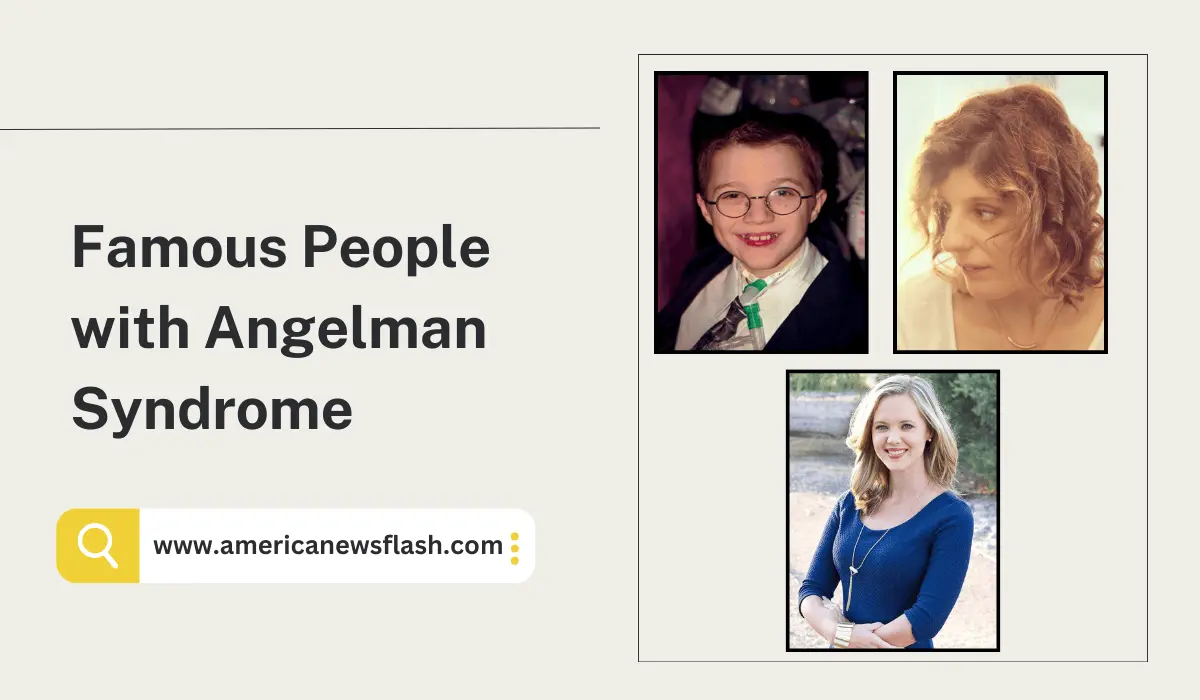Angelman syndrome is a rare genetic disorder that affects about 1 in 15,000 to 20,000 people worldwide. It impacts the nervous system, causing developmental delays, speech impairments, and movement challenges. Despite these hurdles, some famous people with Angelman syndrome have achieved remarkable success and raised awareness about the condition. Let’s explore their inspiring stories.
What is Angelman Syndrome?
Angelman syndrome is caused by a change or loss in the UBE3A gene, crucial for brain development and function. This condition is characterized by:
- Developmental delays and intellectual disability
- Seizures and epilepsy
- Lack of speech or limited verbal communication
- Distinctive facial features, such as a wide mouth and protruding tongue
- Frequent laughter, smiling, and excitability
- Difficulty with balance and coordination
Despite these challenges, many individuals with Angelman syndrome lead happy and fulfilling lives.
Mattie Stepanek: Writer and Peace Advocate
Mattie Stepanek (1990–2004) was an American poet and peace advocate who touched the hearts of many. Diagnosed with Angelman syndrome, Mattie achieved significant accomplishments in literature and advocacy.
Mattie began writing poetry at a young age, expressing his thoughts on life, love, and peace. His poetry collection, “Heartsongs,” was published when he was just 11 years old. It received widespread acclaim for its profound wisdom and emotional depth. His simple and sincere writing resonated with readers worldwide.
In addition to his literary achievements, Mattie was a passionate peace advocate. He appeared on various talk shows, including The Oprah Winfrey Show, sharing his vision for a world united in harmony. His message of hope and perseverance continues to inspire many, and his legacy lives on through the Mattie J.T. Stepanek Foundation, promoting peace, literacy, and youth leadership.
Carly Fleischmann: Non-Verbal Communicator and Advocate
Carly Fleischmann, a Canadian woman diagnosed with Angelman syndrome, has made a significant impact as a non-verbal communicator and advocate. Her journey to find her voice has been truly remarkable.
Despite the challenges posed by Angelman syndrome, Carly’s insights and creativity shine through her work. With the help of technology, including a communication device, Carly has become a powerful figure in supporting individuals with communication disorders. Her blog and social media presence have garnered widespread attention, helping raise awareness and foster understanding.
In addition to her advocacy work, Carly has made notable contributions to the entertainment industry. She hosts the popular web series “Speechless with Carly Fleischmann,” where she interviews celebrities and shares her unique perspective on various topics. Her engaging interviews and heartfelt conversations have earned her a devoted following, and her efforts to bridge the gap between individuals with disabilities and the general public continue to make a difference.
Jillian Benfield: Media Personality and Advocate
Jillian Benfield, an American journalist and media personality, uses her platform to raise awareness about Angelman syndrome and advocate for individuals with special needs. Diagnosed with the condition, Benfield has made significant strides in the media industry, pushing for greater understanding and support for those affected by Angelman syndrome.
Benfield’s career in journalism has included roles as a news anchor and reporter, where she has brought attention to important issues and stories. Her experience with Angelman syndrome has fueled her commitment to highlighting the challenges faced by individuals with the condition and their families.
Through her work, Benfield has been a vocal advocate for increased research funding and improved services for individuals with Angelman syndrome. Her efforts to share her story and amplify the voices of others with similar experiences have contributed to greater awareness of the condition and its impact on individuals and their families.
Is Arsenal considered the best team in the world and why?
Overcoming Challenges with Resilience
Individuals with Angelman syndrome face significant challenges, but their stories of resilience and triumph inspire us all. They show us how to overcome obstacles with determination and strength, highlighting the importance of diversity and the unique gifts they bring to the world.
For instance, Sarah, a young woman with Angelman syndrome, found her passion in art despite communication difficulties. With her family’s support, she became a successful artist, showcasing her work in local galleries and inspiring others with Angelman syndrome to pursue their dreams.
Alex, a college student with Angelman syndrome, excels academically and is an active advocate for disability rights on campus. He encourages his peers to embrace their unique strengths and overcome challenges, motivating others to do the same.
Celebrating Accomplishments
The stories of individuals with Angelman syndrome remind us of the incredible potential within each person, regardless of the challenges they face. Their achievements in literature, advocacy, art, and more offer hope and inspiration to countless others.
Emily Iland, for example, is an advocate and author who uses her experiences to educate the public and help families better understand Angelman syndrome. Her work promotes a more inclusive and compassionate society.
Liam Pacheco, an artist known for his vibrant paintings, celebrates the creativity and unique perspectives of individuals with Angelman syndrome. His art not only showcases his talent but also raises awareness about the condition.
Raising Awareness and Advocacy
Raising awareness about Angelman syndrome is crucial for educating the public, supporting families, and advancing research. Organizations like the Angelman Syndrome Foundation (ASF) and the International Angelman Syndrome Organization (IASO) lead these efforts. They run educational programs, fundraisers, and advocacy campaigns to ensure the needs of those with Angelman syndrome are met.
Social media is also crucial in helping spread the word. Families, groups, and organizations use these platforms to share information, connect with others, and amplify the voices of those with Angelman syndrome, fostering a sense of community and understanding.
Advancements in Angelman Syndrome Research
The Angelman syndrome research community is dedicated to advancing our understanding of this rare genetic disorder. Recent breakthroughs and advancements bring hope for new treatments and improved quality of life for those affected.
Researchers have gained a deeper understanding of the genetic mechanisms underlying Angelman syndrome, leading to potential new treatments like gene therapy and pharmaceuticals. These developments offer the promise of personalized treatment strategies that could significantly improve life for individuals with the condition.
Coping Strategies for Families
Angelman syndrome impacts families emotionally, financially, and practically, requiring a strong support system and effective coping strategies. Families can benefit from:
- Joining support groups to connect with others facing similar experiences
- Seeking counseling or therapy to process the emotional impact
- Advocating for the individual’s educational and medical needs
- Implementing structured routines to provide stability
- Prioritizing self-care to prevent caregiver burnout
Support services, such as the Angelman Syndrome Foundation and local support groups, provide resources and advocacy for families affected by Angelman syndrome. Respite care services and educational advocacy also play essential roles in helping families navigate the challenges they face.
The Impact of Angelman Syndrome on Families
Angelman syndrome affects more than just the individuals diagnosed with the disorder. Families face emotional, financial, and practical challenges that require a strong support system.
Coping strategies are vital for these families, helping them manage the emotional impact and ensure the best possible care for their loved ones. Support systems can include healthcare providers, educational specialists, community organizations, and friends who understand the challenges they face.
Inspiring Achievements of People with Angelman Syndrome
Despite the challenges, people with Angelman syndrome have shown great strength and resilience. Many have overcome obstacles to make significant contributions to their communities and the world.
Emily Iland, for example, is an author and advocate who has helped break down the stigma surrounding Angelman syndrome. Her work empowers those with the condition to lead fulfilling lives.
Carly Fleischmann, known for her exceptional communication skills, uses technology to express herself and advocate for increased support and resources for those with Angelman syndrome. Her story inspires many and demonstrates what individuals with Angelman syndrome can achieve.
Conclusion
The inspiring stories of individuals with Angelman syndrome highlight their remarkable accomplishments and the potential within each person. Despite the challenges they face, they have become advocates, artists, writers, and more, raising awareness and inspiring countless others.
As society continues to learn more about Angelman syndrome and those it affects, these individuals remind us of the importance of embracing diversity and celebrating the unique gifts everyone brings to the world.
FAQ
What is Angelman Syndrome?
Angelman syndrome is a rare genetic disorder. It happens when the UBE3A gene is lost or changed. People with it have intellectual disability and developmental delays.
They also have behaviors like being very happy, laughing a lot, and walking specially.
What are the common symptoms of Angelman Syndrome?
Angelman syndrome brings many symptoms. These include thinking problems, slow speech, seizures, and trouble sleeping. People with it often look different too.
They are usually very happy, laugh a lot, and walk specially. This makes them stand out.
Are there any famous people with Angelman Syndrome?
Yes, some famous people have Angelman syndrome. Carly Fleischmann is an author and advocate. Liam Fitzgerald is a motivational speaker and athlete.
How do families cope with the challenges of Angelman Syndrome?
Families face big emotional, financial, and practical challenges. But, they’ve found ways to cope. They use therapy, educational help, and community groups to support their loved ones.
What advancements have been made in Angelman Syndrome research?
Research has made big strides in understanding Angelman syndrome. New gene therapies are being developed. Researchers are finding new ways to treat its symptoms.
How can I get involved in raising awareness about Angelman Syndrome?
You can help by joining advocacy campaigns, supporting groups, and sharing stories. This helps spread the word and educate others about Angelman syndrome.

